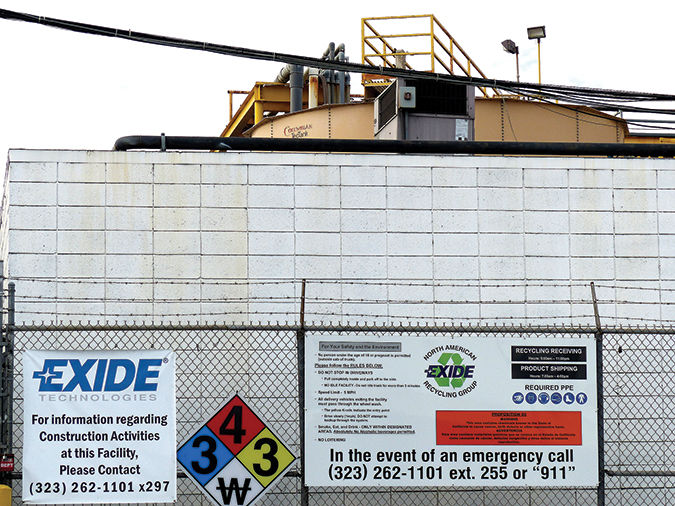Parents at a Head Start preschool in East L.A. are worried that their toddlers might ingest the lead particles that can cause permanent physical and mental development problems, including lowered I.Q.
In a recent editorial, the Los Angeles Times wrote that California regulators at both the South Coast Air Quality Management District (AQMD) and the Department of Toxic Substances Control “have failed to protect public health” for people living within at least a mile of the Exide battery recycling plant in Vernon.
Msgr. John Moretta, pastor of Resurrection Parish in Boyle Heights, is frustrated as well as angry. “Can you imagine how we feel — first lead, then arsenic and now lead again?” he told The Tidings.
On March 11, state toxic waste regulators announced that soil tested this year at 39 homes and two schools (including Salazar Park Head Start in East Los Angeles) had high levels of lead.
The state considers anything above 80 parts per million to be a possible health threat needing further study. Testing at the Head Start site found 95 parts per million, while homes in Boyle Heights average 222 and Maywood 160. The highest figure was from a Boyle Heights home, testing out at above 580 parts per million.
The soil depth tested at these locales was between three and six inches. Msgr. Moretta is convinced that if they dug deeper — with the plant’s history of operating on-site since the early 1920s — even higher concentrations would be found.
Regulators said their main “concern” was for children and pregnant women. Lead is a strong neurotoxin especially harmful to children six or younger, who can suffer severe learning disabilities with only limited exposure. The state’s toxic control agency ordered not only more testing but for Exide to develop a plan to protect children and pregnant women.
(The AQMD did approve the company’s modest clean-up plan late last month. But the agency’s executive director, Barry Wallerstein, had his doubts it will ever be implemented. “Their recent public announcements are disappointing, and we are concerned they are misleading to the public,” he said.)
The L.A. County Board of Supervisors reacted to the new lead findings by creating a “strike team” to target facilities that pollute the air, ground and water with toxins. The first case on deck is Exide, located a few blocks north of the Los Angeles River.
During a public hearing at Resurrection’s parish hall on March 19, residents from neighborhoods and communities near the plant demanded, as they had many times in the past, that the plant be closed permanently. Some testified they have loved ones suffering with asthma, while others claimed a spouse had died prematurely because of the plant’s toxic emissions. Many testified that their biggest fear was for the health of their young sons and daughters.
An Exide spokeswoman cautioned, “Not a lot to fear here. We are part of the community. We want to be part of the solution and have been working diligently with regulators up and down the state to ensure and facilitate that we stay in compliance.”
‘Being hypocritical’
But community organizer Robert Cabrales demanded, “We’ve been hearing the same junk over and over and over. When are we going to see cleanup in communities?”
Nevertheless, Department of Toxic Substances Control officials told the 300-plus crowd it was simply a matter of not letting their children play on the ground. They also suggested that kids and pregnant women would be better off not eating green leafy vegetables grown locally.
That remark got Msgr. Moretta’s blood boiling. “I said, ‘How do you tell a child not to play in the dirt? That’s part of being a child,’” he told The Tidings. “Do they expect that to be a solution? And for Exide to say ‘we’re committed to community health and working tireously with regulators,’ I think they’re being hypocritical. It’s an affront to the community, because the community knows that they’re the ones responsible. This is why we’re fighting all these years.”
The pastor of Resurrection for 30 years says it’s “very important” to note that of the 500 major companies in California that deal with hazardous waste materials, only one doesn’t have a permanent permit — Exide Technologies. He points out the company has had a temporary permit for more than 20 years, which he calls “ridiculous.”
He also does not buy the facility’s argument that the lead really comes from the flaking lead paint of old houses and apartments in the densely populated area. He notes that lead paint hasn’t been used for 40 years.
Msgr. Moretta believes the new county strike team is a “fantastic concept,” bringing all the different government agencies together to focus on Exide and other toxic polluters for the first time. In fact, he was privy to its planning.
But the clergyman, ordained in 1968, also believes Resurrection’s eight-year struggle isn’t over. “I guess it’s going to be a 12-round fight,” he mused. “But we’re in there for the fight and continuing it. The community is more and more educated. The community is more and more aroused to understand that this is a very serious thing.
“How can you say it’s not a public health risk to tell people that you can’t eat your vegetables that your grow in your back yard, and you shouldn’t walk around barefoot in the dirt, and the kids have to be careful to wash themselves after playing outside?
“It’s ridiculous,” he said. “It’s ridiculous.”
In Msgr. Moretta’s view, the best question at the recent hearing was asked last: “Why did you, the regulators, ask Exide, who are the polluters, to come up with a plan to eliminate this problem? Why didn’t you come up with a plan?”

